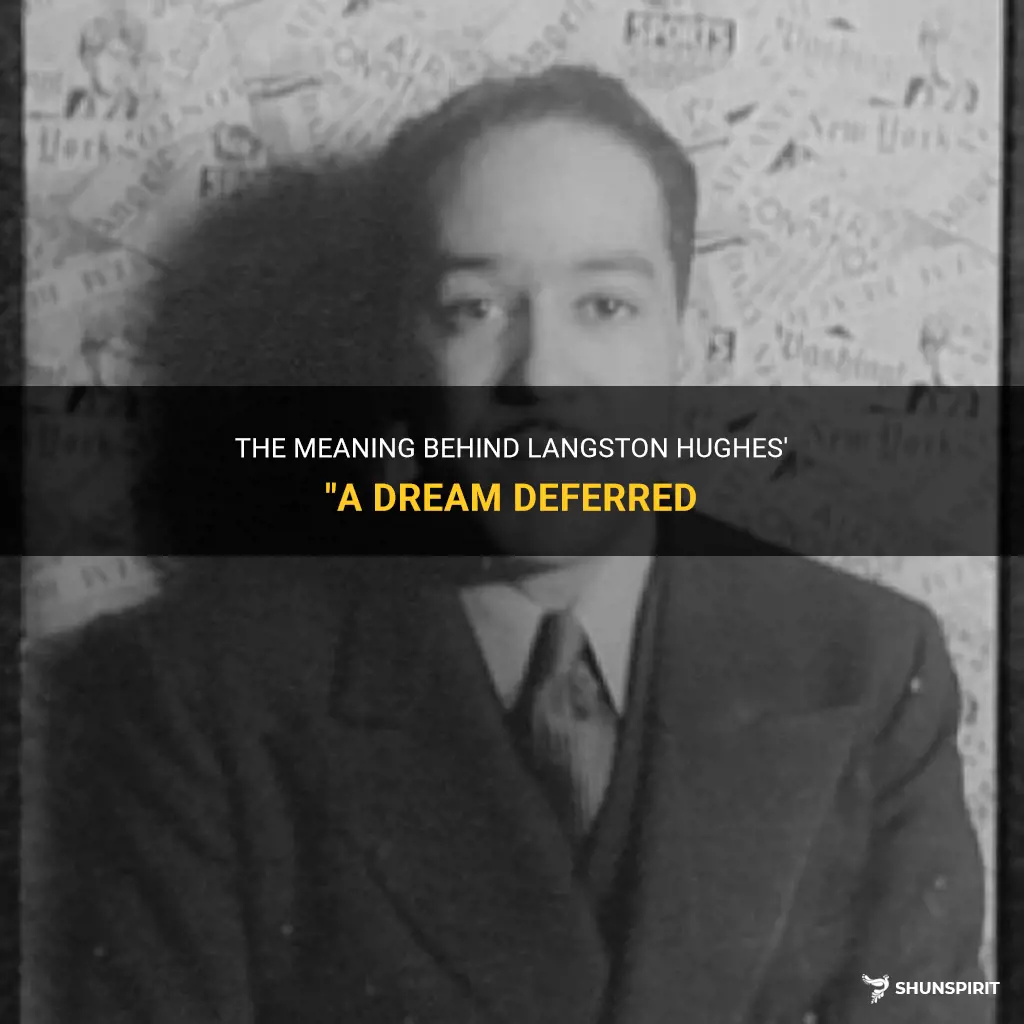
Langston Hughes, renowned poet and leader of the Harlem Renaissance, posed a thought-provoking question in his poem Harlem: What happens to a dream deferred? This powerful query has captivated readers for decades and continues to challenge society's understanding of aspirations and their consequences. Hughes explores the various possibilities of unfulfilled dreams, presenting a compelling allegory that delves into the complexities of the human experience. From examining the explosive potential of suppressed desires to contemplating the long-lasting effects of unrealized ambitions, Hughes forces us to confront the meaning behind a dream deferred and its impact on our lives.
| Characteristics | Values |
|---|---|
| Title | A Dream Deferred |
| Author | Langston Hughes |
| Literal Meaning | A dream that is delayed or postponed |
| Metaphorical Meaning | The dream represents a goal or ambition, which is being delayed or unfulfilled |
| Central Theme | The consequences of delaying one's dreams and aspirations |
| Figurative Language | Uses similes, metaphors, and personification to convey the idea of a deferred dream |
| Poetic Form | Free verse |
| Tone | Frustration, disappointment, and longing |
| Symbolism | The dream represents hopes, desires, and ambitions |
| Poetic Devices | Repetition, alliteration, imagery, and metaphors |
| Historical Context | Written during the Harlem Renaissance, a time of African American cultural and artistic flourishing |
What You'll Learn
- What is the meaning behind Langston Hughes' poem A Dream Deferred?
- How does Hughes use imagery and figurative language to convey the message of the poem?
- Is there a specific historical or cultural context that influenced the creation of A Dream Deferred?
- How does the theme of deferred dreams resonate with the African American experience?
- How does the meaning of the poem A Dream Deferred relate to Hughes' overall body of work?

What is the meaning behind Langston Hughes' poem A Dream Deferred?
Langston Hughes' poem "A Dream Deferred" is a thought-provoking work of literature that explores the consequences of delaying or neglecting one's dreams and aspirations. The poem presents a series of questions and vivid imagery to convey the various possible outcomes of postponing or ignoring one's goals.
The poem begins with the line "What happens to a dream deferred?" This opening question immediately sets the tone of uncertainty and contemplation. It suggests that when dreams are not pursued or fulfilled, they do not simply disappear but rather undergo transformations or consequences.
Hughes then presents a series of possible outcomes for a dream deferred: "Does it dry up like a raisin in the sun? Or fester like a sore-- And then run? Does it stink like rotten meat? Or crust and sugar over-- like a syrupy sweet?" These vivid and evocative images paint a picture of stagnation, decay, and frustration. Each image illustrates a different type of consequence that can occur when dreams are not pursued.
The raisin in the sun metaphor suggests that a deferred dream can wither and lose its vitality, becoming something small and insignificant. The imagery of a festering sore implies that neglecting dreams can lead to pain and discomfort, both for the dreamer and for those around them. The stench of rotten meat symbolizes the unpleasantness and potential harm that can arise from ignoring one's aspirations. Finally, the image of syrupy sweet crust and sugar highlights the possibility of dreams becoming coated in false satisfaction, masking inner dissatisfaction.
These vivid pictures and questions force readers to reflect on the potential outcomes of delaying or neglecting their own dreams. The poem serves as a reminder of the importance of pursuing one's passions and aspirations to avoid the negative consequences described.
In addition to these thought-provoking questions and imagery, Hughes also employs a rhythmic and melodic style of writing in "A Dream Deferred." This musicality adds to the impact of the poem and enhances its emotional resonance. The repetition of certain sounds, such as the "s" and "r" sounds in the second and third lines, creates a sense of tension and unease, mirroring the discomfort associated with deferred dreams.
Through vivid imagery and a rhythmic style, Langston Hughes' poem "A Dream Deferred" inspires readers to consider the significance of pursuing their dreams and the potential repercussions of neglecting them. It serves as a powerful reminder to take action and strive for one's goals in order to avoid the stagnation and dissatisfaction depicted in the poem.
The Symbolic Interpretation of Cake in Dreams
You may want to see also

How does Hughes use imagery and figurative language to convey the message of the poem?
In his poem "#KEYWORD#", Langston Hughes incorporates vivid imagery and figurative language to effectively convey his message to the reader. Through these literary devices, Hughes is able to create a powerful and evocative atmosphere, while also expressing deeper themes and emotions.
One of the ways Hughes uses imagery is through descriptive language that appeals to the senses. For example, in the opening lines of the poem, he writes, "I, too, sing America. / I am the darker brother." Here, Hughes immediately establishes a visual image of himself as a Black man in America, contrasting with the dominant image of a white brother. This imagery of darkness and light effectively conveys the theme of racial inequality and the struggle for equality.
Throughout the poem, Hughes continues to employ vivid imagery to evoke a sense of the Black experience in America. He writes, "They send me to eat in the kitchen / When company comes." This line creates a clear picture of segregation and exclusion, highlighting the discrimination faced by Black people during this time period. By using sensory language, Hughes forces the reader to confront the harsh realities of racial prejudice, emphasizing the need for change.
In addition to imagery, Hughes also utilizes figurative language to further develop his message. One example of this is the use of metaphors. For instance, Hughes writes, "Tomorrow, / I'll be at the table / When company comes." Here, he compares being accepted at the table to being accepted as an equal in society. This metaphor speaks to the desire for inclusion and equality felt by many Black individuals during this time period.
Furthermore, Hughes employs similes to draw connections between his own experiences and those of others. He writes, "Besides, / They'll see how beautiful I am / And be ashamed— / I, too, am America." By comparing himself to America, Hughes is suggesting that his own worth and beauty should be recognized and valued by society. This simile serves as a powerful statement of Black pride and self-acceptance.
In conclusion, Langston Hughes effectively conveys the message of his poem "#KEYWORD#" through his use of imagery and figurative language. By employing descriptive language that appeals to the senses, Hughes brings the reader into his world, evoking a strong emotional response. Through metaphors and similes, he expresses deeper themes and emotions, highlighting the need for equality and acceptance in society. Overall, Hughes' use of imagery and figurative language adds depth and power to his poetry, leaving a lasting impression on the reader.
Unraveling the Symbolism of Wind in Dreams
You may want to see also

Is there a specific historical or cultural context that influenced the creation of A Dream Deferred?
A Dream Deferred is a thought-provoking poem written by Langston Hughes. It explores the consequences and emotions associated with delayed dreams. To fully understand the poem, it is important to consider the historical and cultural context in which it was created.
Langston Hughes was a leading figure in the Harlem Renaissance, a cultural movement that took place in the 1920s and 1930s. The Harlem Renaissance was a time of great artistic and intellectual achievement for African Americans, especially in the fields of literature, music, and visual arts. It was a period of immense creativity and cultural pride.
A Dream Deferred, also known as Harlem, was published in 1951, which was a time of considerable social and political change in the United States. The Civil Rights Movement was gaining momentum, and African Americans were fighting for equality and the end of segregation. This context adds a deeper layer of meaning to the poem.
In A Dream Deferred, Hughes poses a series of questions about what happens to a dream that is delayed. He uses vivid and powerful imagery to explore the emotions that arise when dreams are put on hold. For example, he asks if a dream deferred "dries up like a raisin in the sun" or "does it explode?" These metaphors convey a sense of frustration, anger, and potential for violence when dreams are continually postponed.
The poem can be seen as a reflection of the experiences of African Americans during this time. They had been promised equality and opportunity, but were often met with discrimination and oppression. Dreams of freedom, justice, and success were constantly being deferred, leading to feelings of immense frustration and resentment.
Moreover, the poem can also be interpreted more universally, speaking to the human experience of having unfulfilled dreams and ambitions. It encourages readers to consider the consequences of allowing dreams to go unattended. It highlights the importance of taking action and pursuing one's dreams, as delaying them can have dire consequences.
In conclusion, the historical and cultural context in which A Dream Deferred was written greatly influenced its creation. Langston Hughes was influenced by the Harlem Renaissance and the social and political climate of the time. The poem serves as a reflection of the experiences of African Americans and explores the emotions associated with delayed dreams. It reminds readers of the importance of pursuing one's dreams and the potential consequences of allowing them to go unattended.
The Spiritual Significance of Painful Dreams: An Insightful Exploration
You may want to see also

How does the theme of deferred dreams resonate with the African American experience?
The theme of deferred dreams, or dreams that are delayed or put on hold, is deeply resonant with the African American experience. Throughout history, African Americans have faced numerous obstacles and systemic injustices that have hindered their ability to achieve their dreams and aspirations. This theme is prevalent in literature, music, and other forms of art created by African Americans, as they grapple with the effects of racism and discrimination.
One prominent example of the theme of deferred dreams is found in the poem "Harlem" by Langston Hughes. The poem asks the question, "What happens to a dream deferred?" and explores the various ways in which the postponement of dreams can have negative consequences. Hughes suggests that deferred dreams can "dry up like a raisin in the sun" or "fester like a sore." These powerful metaphors convey the frustration and despair that can arise when individuals are unable to pursue their goals and aspirations due to systemic barriers.
In the context of the African American experience, deferred dreams can be understood as the result of institutionalized racism and discrimination. African Americans have faced a long history of racial oppression, from slavery to Jim Crow segregation to ongoing systemic inequalities. These injustices have limited opportunities for education, employment, and upward mobility for African Americans, making it difficult for them to achieve their dreams and aspirations.
For example, during the Jim Crow era, African Americans were subjected to racial segregation and denied equal access to education and employment opportunities. These systemic barriers prevented many African Americans from pursuing higher education or obtaining well-paying jobs, thereby delaying the realization of their dreams. Even today, African Americans face higher rates of poverty, unemployment, and incarceration compared to their white counterparts, further hindering their ability to achieve their dreams.
In addition to these systemic barriers, African Americans also face the psychological impact of racism and discrimination. Constant exposure to racial stereotypes, microaggressions, and overt acts of racism can erode one's sense of self-worth and limit their belief in their own abilities. This internalized racism can lead to a sense of hopelessness and the abandonment of dreams and ambitions.
However, despite these challenges, the African American community has also demonstrated resilience, strength, and the ability to overcome these obstacles. Many African Americans have successfully pursued their dreams and achieved great success in various fields, including literature, politics, science, and entertainment. Despite the adversity they face, African Americans continue to strive for their dreams, challenging the notion that their dreams should be deferred indefinitely.
In conclusion, the theme of deferred dreams resonates deeply with the African American experience. African Americans have long faced systemic barriers, racism, and discrimination that have hindered their ability to pursue their dreams and aspirations. However, the African American community has also shown resilience and determination in the face of these challenges, reminding us that dreams can still be achieved, even in the face of adversity. It is important to continue to address and dismantle systemic inequalities to ensure that dreams are not deferred unjustly.
The intriguing symbolism of dreaming about a snake head without a body
You may want to see also

How does the meaning of the poem A Dream Deferred relate to Hughes' overall body of work?
Langston Hughes is one of the most celebrated poets of the Harlem Renaissance, a literary and cultural movement that took place in the 1920s and 1930s. His poems often explore the experiences of African Americans and the complexities of their lives during this time period. One of his most famous poems, "A Dream Deferred," is a perfect example of how his work reflects the struggles and aspirations of his community.
The poem begins with the line "What happens to a dream deferred?" This opening line immediately sets the tone for the rest of the poem, as it poses a question that is both existential and deeply personal. Hughes then goes on to present several possible outcomes for a deferred dream, each one provoking a sense of frustration and disappointment.
For example, he suggests that a dream deferred "dries up like a raisin in the sun." This metaphor paints a vivid image of a dream losing its vitality and becoming lifeless. It conveys the sense of time passing and opportunities slipping away, leaving only a dried-up remnant of what could have been.
Another option he presents is that a deferred dream "festers like a sore." This image creates a sense of pain and infection, highlighting the emotional and psychological toll that unfulfilled dreams can have on an individual. It also speaks to the potential for social unrest and discontent that can arise when people are denied the opportunity to pursue their ambitions.
Hughes also suggests that a deferred dream "sags like a heavy load." This imagery conveys the weight and burden of unfulfilled potential. It speaks to the way in which dreams can weigh on a person's mind and limit their ability to move forward. This image is particularly poignant when considering the historical context in which Hughes wrote, as many African Americans faced significant barriers and limitations in their pursuit of success.
One of the most powerful aspects of "A Dream Deferred" is its ability to capture the complexities of the human experience. Hughes recognizes that dreams are not easy to define or achieve, and that they can be influenced by a wide range of factors. He acknowledges that dreams can be deferred by societal pressures, personal circumstances, and the limitations imposed by others. This recognition of the many different ways in which dreams can be deferred is what makes the poem so relatable and enduring.
In many ways, "A Dream Deferred" encapsulates the themes and ideas that run throughout Hughes' body of work. His poems often explore the challenges and aspirations of African Americans living in a society that was often hostile and discriminatory. He frequently portrays their struggles with poverty, racism, and limited opportunities, while also emphasizing their resilience, creativity, and capacity for hope.
Hughes' poems are characterized by their use of vivid imagery, rhythm, and language that reflects the cadences and dialects of African American culture. "A Dream Deferred" is no exception, employing rich metaphors and evocative language to convey the frustration and disappointment that come with unfulfilled dreams.
Overall, the meaning of "A Dream Deferred" is deeply intertwined with Hughes' overall body of work. It captures the complexities of the African American experience, highlighting the challenges faced by individuals and communities and the resilience and hope that can arise in the face of adversity. It is a poem that continues to resonate with readers today, reminding us of the importance of pursuing our dreams and the consequences of denying others the opportunity to do the same.
The symbolic meaning behind dreaming of rock climbing
You may want to see also
Frequently asked questions
In Langston Hughes' famous poem "Harlem," the phrase "a dream deferred" refers to the idea of postponing or delaying one's dreams and aspirations.
Some examples of deferred dreams in the poem include postponed dreams of racial equality and justice, unfulfilled aspirations for social and economic mobility, and delayed dreams of personal expression and creativity.
The overall message of the poem is that when dreams are deferred or delayed, they do not simply disappear or go away. Instead, they can fester and cause frustration, anger, and even destruction.
Langston Hughes uses vivid imagery and powerful language throughout the poem to convey the frustration and potential consequences of a deferred dream. For example, he compares a deferred dream to a "raisin in the sun" or a "festering sore," conveying the idea that delaying one's dreams can lead to decay and pain.








3 Comments
Samantha Gibbs
Sofia Jennings
Yasmine Hendrix